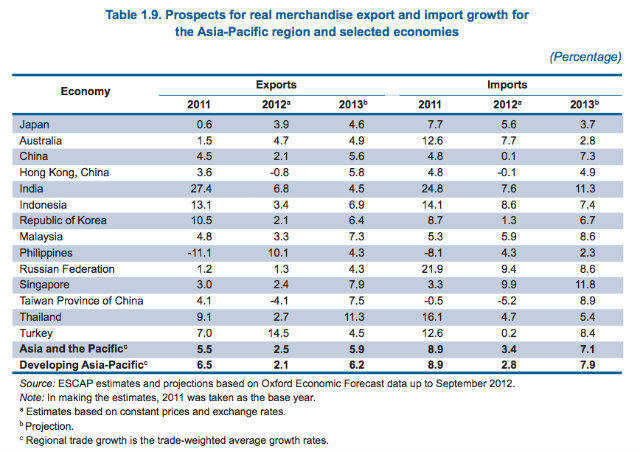SUMMARY
This is AI generated summarization, which may have errors. For context, always refer to the full article.
![]()
MANILA, Philippines – Despite expectations that global trade will improve this year, the United Nations Economic and Social Commission for Asia and the Pacific (UNESCAP) forecast the Philippines’ export and import growth to weaken this 2013.
In its Asia-Pacific Trade and Investment Report 2012, the UNESCAP said export growth in the Philippines will hit 10.1% in 2012 and slow to 4.3% in 2013. Imports growth, on the other hand, is expected to average 4.3% in 2012 before slowing to 2.3% in 2013.
“Exports are projected to further weaken in 2013 in India, the Philippines and Turkey, while import growth is expected to remain stalled during 2013 in Australia and Japan [among the Asian developed countries] and in Indonesia and the Philippines [among the developing countries of the region],” UNESCAP said.

This continuing weak global demand and China’s economic slowdown are behind UNESCAP’s Philippine trade outlook this 2013. It noted that countries like Australia, Indonesia, the Republic of Korea and Taiwan are already feeling the pinch of weaker demand from China.
“In short, the region’s exports of raw materials and intermediate goods, such as rubber products, electronics, plastics and chemicals, will potentially suffer from both a softening of demand in China and from weak global markets,” the report stated.
To weather the uncertainties in regional trade, countries must become more aggressive in market and product diversification, UNESCAP said. These efforts are important since competition in the region will be “fierce” because of the weaker demand.
The report also recommended countries to learn more about import demand, particularly obstacles in sourcing of goods, services, and resources. It added that strengthening regional cooperation will be key in this regard.
The UNESCAP also said countries must also be more conscious in highlighting the importance of using green production lines. This will help ease the pressure on energy resources needed to keep regional and global trade moving.
“Greater attention will have to be given to the greening of production in the region – and granting more liberal market access for green products and services within the region – in order to reduce reliance on non-renewable sources of energy, yet enable the growth needed for inclusive development,” the report stated.
The APTIR provides information on and independent analyses of regional trends and developments in trade and investment as well as emerging issues in trade, investment and trade facilitation policies.
It also tackles the impacts of these policies on countries’ abilities to meet the challenges of achieving inclusive and sustainable development. – Rappler.com
Add a comment
How does this make you feel?
There are no comments yet. Add your comment to start the conversation.